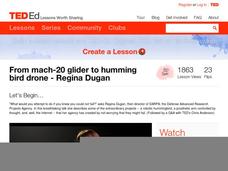Zach Star
What is Biomedical Engineering?
Biomedical engineering is a broad major that encompasses mechanical engineering, electrical engineering, materials engineering, biology, computer science, and computer engineering. It's about using all these disciplines and applying the...
TED-Ed
From Mach-20 Glider to Humming Bird Drone
"What would you attempt to do if you knew you could not fail?" This question guides Regina Dugan's exploration of amazing achievements in science and engineering that push the boundary of impossibility. From robotic hummingbirds and...
National Science Foundation
National Science Foundation: Science of the Winter Olympics: Competition Suits
Olympic athletes have long worn special competition clothing to gain an edge. Science and technology continue to improve on what they wear. Hear from Olympians Chad Hedrick, Steve Holcomb and Erin Hamlin, and Melissa Hines, the director...
National Science Foundation
National Science Foundation: Profiles of Scientists and Engineers: Materials Engineer
Meet Carlos Barrios, a materials engineer, who shows us some of the latest engineering projects taking place at 3M. His work in adhesives can have applications to such diverse areas as medicine, sports, aerospace, and electronics. He...
Crash Course
Crash Course Kids 40.2: Material Magic: Making Diamonds
Find out how materials scientists have made diamonds in a lab, and why it is so important. [4:41]
Crash Course
Crash Course Kids 40.1: Material World
Learn how material scientists are working on making new materials or how they are improving the ones we have. [4:36]
National Science Foundation
National Science Foundation: Science of Innovation: Origami Structures
To engineer Mary Frecker of Pennsylvania State University, origami holds the future for designing tools that could be used in fields such as medicine and space exploration. [5:55]
PBS
Pbs Kids: Design Squad: How Does Velcro Work?
Have you ever wondered how velcro works? Watch as Nate answers this question. [2:31]
PBS
Pbs Kids: Design Squad: How Does an Eraser Work?
Have you ever wondered how an eraser works? Watch as Deysi from Design Squad explains how an eraser erases! [1:47]
PBS
Pbs Kids: Design Squad: How Are Crayons Made?
Travel behind the scenes of MIT's D-Lab in this Design Squad field trip. Learn how people in the Himalayan Mountains use natural dyes to create crayons that are sold around the world! [2:31]
PBS
Pbs Kids Design Squad: Sticky Note Challenge
Man vs. Sticky note. We bet you'll be surprised by these ordinary sticky notes' shear strength. [1:31]
Crash Course
Crash Course Engineering #20: The Polymer Explosion
A video investigating polymers and their applications. Learn how they are made of long, repeating chains of smaller molecules. [9:23]
Science Friday Initiative
Science Friday: Batter Up!
Ira and guests talk about the physics and materials science that go into the making of a baseball bat.
PBS
Pbs Learning Media: Nova: What Will the Future Be Like?: Wearable Robots
Learn about in advances in powered exoskeletons, a kind of wearable robot. [5:44]
Science Friday Initiative
Science Friday: Turning Girl Scout Cookies Into Graphene
Scientists have transformed baked goods into graphene, worth two million times the price of gold.












